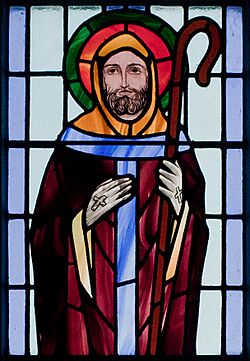Colmán of Lindisfarne facts for kids
Quick facts for kids Colmán of Lindisfarne |
|
|---|---|
| Bishop of Lindisfarne | |

Stained glass window of St. Colmán at St. Benin's Church, Kilbennen, County Galway
|
|
| Appointed | 661 |
| Reign ended | resigned 664 |
| Predecessor | Finan of Lindisfarne |
| Successor | Tuda of Lindisfarne |
| Personal details | |
| Born | c. 605 Ireland |
| Died | 18 February 675 Ireland |
| Denomination | Christian |
| Sainthood | |
| Feast day | 18 February |
| Venerated in | Eastern Orthodox Church Roman Catholic Church Anglican Communion |
Colmán of Lindisfarne (around 605 – 18 February 675 AD), also known as Saint Colmán, was an important Christian leader. He served as the Bishop of Lindisfarne from 661 until 664.
Life of Colmán
Colmán grew up in the west of Ireland. He received his education on the island of Iona, which was a famous center for learning at the time. In 661, Colmán became the Bishop of Lindisfarne, following other respected bishops like Aidan and Finan.
The Synod of Whitby
A very important meeting called the Synod of Whitby took place in 664. King Oswiu of Northumbria organized this meeting. The main topic was how to figure out the correct date for Easter. Colmán and his followers used an older, "Celtic" way of calculating Easter. However, the King decided that everyone should use the "Roman" way, which was followed by most of Europe.
Because of this big change, Colmán decided to leave his position as Bishop of Lindisfarne. He felt strongly about the Celtic traditions. After resigning, Colmán traveled back to Scotland and then to Iona. Some later stories say he started several churches in Scotland, but there aren't many old records from the 600s to confirm this.
Founding Monasteries in Ireland
From Iona, Colmán sailed to Ireland. In 668 AD, he settled on an island called Inishbofin. There, he founded a monastery and a school. This school later became known as the School of Mayo. When Colmán came to Mayo, he brought some important items from Lindisfarne. These included some bones of Saint Aidan and a piece of what was believed to be the true cross.
Colmán arrived in Ireland after a serious illness had affected many people between 664 and 665. On Inishbofin, a problem arose between the Irish and English monks. In the summer, the Irish monks would leave to visit places they knew. They did not help with the harvest. Then, when winter came, they would return and want to share the food the English monks had gathered.
This situation caused tension in the monastery. The Irish monks might have been moving their livestock to different pastures, a practice called 'booleying'. They might also have been visiting their families on the mainland. When they returned in winter, they would consume the food that the English monks had worked to gather.
To solve this problem, Colmán moved his English followers to the mainland. He founded a new monastery for them at a place called "Magh Eó". This name means "the Plain of Yew Trees". It later became known as "Mayo of the Saxons".
Colmán spent his final years on the island of Inishbofin. He passed away in 674. His feast day, which celebrates his life, is observed on August 8 and November 13.
 | Isaac Myers |
 | D. Hamilton Jackson |
 | A. Philip Randolph |

